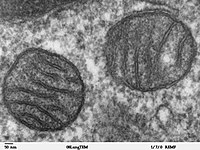
Photo from wikipedia
Despite a relatively developed understanding of the pathophysiology underlying primary and secondary mechanisms of cell death after ischemic injury, there are few established treatments to improve stroke prognoses. A major… Click to show full abstract
Despite a relatively developed understanding of the pathophysiology underlying primary and secondary mechanisms of cell death after ischemic injury, there are few established treatments to improve stroke prognoses. A major contributor to secondary cell death is mitochondrial dysfunction. Recent advancements in cell-based therapies suggest that stem cells may be revolutionary for treating stroke, and the reestablishment of mitochondrial integrity may underlie these therapeutic benefits. In fact, functioning mitochondria are imperative for reducing oxidative damage and neuroinflammation following stroke and reperfusion injury. In this review, we will discuss the role of mitochondria in establishing the anti-oxidative effects of stem cell therapies for stroke.
Journal Title: Antioxidants
Year Published: 2023
Link to full text (if available)
Share on Social Media: Sign Up to like & get
recommendations!